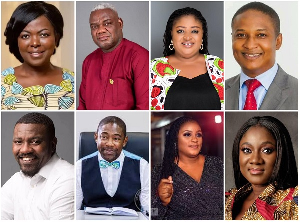Following the dispensation of multi-party democratic rule in Ghana some fifteen years ago, Ghana’s Vice President, Aliu Mahama, a Kwame Nkrumah University of Science and Technology-trained building technologist, unlike other vice-presidents, has been able to turn the vice-presidency from a shadowy place, under the clutches of the presidency, into a formidable developmental machine, encouraging either the correct appropriation of information technology or the need to borrow from Botswana’s ability to mix their norms, values and traditions into their enviable 25-year running prosperity.
This picture of the Mahama as the poster-man of progress and reasoning contradicts his statement (July 15, GNA) at the Northern Regional capital of Tamale that, "It is God who chooses a leader.” Mahama’s statement comes against the background of some elites advocating for enlightening the Ghana culture in order to refine some of the deadly inhibitions for progress. It is worrying in a country where superstition is counterproductive and a dent on those, such as Prof. Kojo Yanka, of the University of Ghana, advising for the intellectualization of the Ghanaian culture via its indigenous languages.
Mahama’s God-and-leadership speech has implications not only of reasoning out the inadequacies in Ghana’s nascent democracy but also opening up the democratic process by encouraging ideas, debates, wisdom and merit in Ghana’s development process. If God is He Who is to choose a leader, then Ghanaians should rest and forgo any hassle and let God do that for them. More emanating from its culture, superstition, Malams, juju-marabout mediums, prophets and other spiritualists have been the bane of Ghanaian politics and progress since independence from colonial in 1957. But nowhere in the almost 50 years since the creation of Ghana has superstition influenced politicians than today. The influence of superstition, which can come in the form of all sorts of dabbling in native spiritualism, on politics reflects how deep superstition has penetrated the Ghanaian society and its progress. The influence of superstition on politics also reveal how skeptically weak is the Ghanaian intelligentsia. It also shows a society which elites cannot extricate itself from the irrational, and sometimes at the mercy of prophets, juju-marabou mediums, Malams, and other spiritualists.
Such superstitious practices need not be during general elections, it is part-and-parcel of the political elites. All these demonstrate the influence of the Ghanaian culture on politics. In Ghana politics and culture are inseparable, especially the influence of the spiritual aspects of the culture, negative or positive, on politics. In the months and days leading to the general elections in 2008 the business of prophets and other spiritualists are on the ascendancy. The spiritualists are not only ritualizing to help politicians win elections but also interpreting events, even past ones, in prophetic terms. Newspapers, realizing how the public like such tantalizing tales of the spiritual and the political, and how this sell newspapers, give the prophetic interpretations much coverage to the detriment of other development indicators.
The Mahama-God-leadership statement demonstrates how Ghanaian political elites are yet to fully interpret the Ghanaian development process from the sense of rigorous mental toughness and not any emotional jelly in the face of certain inhibitions that have been stifling Ghana’s progress. More seriously the increasingly powerful mass media, despite working in a sea of superstition and prophecies, are yet to fashion out interpretative/commentative genre to help the Ghanaian public able to rationalize issues against the power of superstition, prophecies and other spiritualists. The Mahama-God-leadership statement also reveals how the mixture of superstition, prophecies and politics blur the ability of the already naive electorate to rationalize serious national development issues. This may explain why some watchers of Ghanaian politics talk of lack of strong issues to drive Ghana’s blossoming democracy and the development process.
Even serious economic issues are cast in prophetic terms to score political points. In some instances, there are partisan politics among even the prophets and other spiritualists, each prophesying different political parties’ programs in spiritually negative or positive terms. Such enticing enterprise by the prophets and other spiritualists has even swayed leading newspapers that are expected to aid in rationalizing issues. In the build-up to the 2004 general elections, the Accra-based The Ghanaian Chronicle, perhaps Ghana’s leading independent newspaper, reports that one "Mr. Moses Growther, a prophet, has stated that the former President, Flt. Lt. (rtd.) Jerry John Rawlings, was a man sent by God to punish us Ghanaians for our iniquities and disobedience to Him, hence the serious economic suffering visited on the nation. According to him, Ghanaians became indolent, after inheriting a curse from the leadership of the first President of Ghana, Dr. Kwame Nkrumah, that any government who toed the line of his ideological principle would worsen the nation's economic situation."
From fortune-tellers to Malams, juju-marabou mediums to spiritualist to prophets exploiting the psychology that emanates from the Ghanaian culture, they have effectively hoodwinked Ghanaian politicians, and in effect, the spiritualists are driving Ghanaian politics and development process.



















